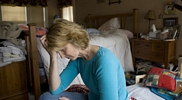We have all seen the “Special Reports” on the evening news. Another story about someone’s aging parent being abused in a nursing home. The abuses range from the neglect of letting an elder lay in their own urine for hours to actual physical abuse like slapping and sexual abuse. an aging parent living away from home in someone else’s care could cause many a sleepless night.
Nursing homes can be very appropriate elder care solutions. Even the best- rated nursing homes can have hiring problems. Be assured there are things you can do to proactively look after your aging parent. The first line of defense is having family members visit regularly. This alerts any would be assailant that your parent has a family that is actively involved in providing care. After all they never know when someone is going to “show up” for a visit.
While having a larger support network that can rotate visits makes life much easier for the care giver; simply changing your visitation schedule have a big impact. Caring for aging parents also means keeping an eye out for the signs of abuse as well as risk factors that potentially create an abusive environment.
Negligence is the simplest and most common form of abuse. For example, in 2001 an elderly woman living is a nursing home wandered into a courtyard. The security alarm had been disabled by employees, so they could got outside undetected to smoke. The door locked behind the elderly patient trapping her outside. The result of the negligence? The 88-year-old woman died of exposure.
When the staff do not do their jobs it’s negligence. Negligence on the part of those hired to help in caring for aging parents s can be seen in the little things. Is the staff member constantly on the phone while doing other tasks like making beds, or while dad is left sitting in a chair? Is the staff constantly in the back talking, laughing and eating rather than moving among the patents? Some of the signs include obvious malnutrition, patients not clothed properly, the smell of feces or urine on the resident. Others signs may include untreated medical conditions like bed sores and unchanged bandages or dressings.
Physical abuse
The nursing director of one California home has been accused of restraining elderly patients by giving them powerful drugs, resulting in the deaths of three of the residents. The state’s attorney general said the director drugged one of the patients simply for glaring at her. While an extreme example it is clearly physical abuse.
Most physical abuse is simpler, pinching the patient, slapping, shoving and spitting are a few examples. Experts say physical abuse is the number one type of abuse directed at the elderly. Bruises, burns, puncture wounds, and unexplained weight loss are all telltale signs that the person you’ve trusted in caring for aging parents may be abusing your family member. Also, if your loved one is reluctant to discuss how they got an injury, it can be a sign of physical abuse.
Sexual Abuse
If you are caring for an aging parent, you know that few things are more stomach-churning than the thought of sexual abuse against the elderly in a nursing home. Sexual abuse can take a lot of form and range from rape, indecent touching, and sexual assault, to forced nudity.
If the person you’ve hired to help in the caring for an aging parent is sexually abusing your family member, here are some of the signs: inappropriate affection by a home employee, bruises on the inner thighs, breasts, buttocks, or genitals, torn or stained clothing, or fear of a particular staff member.
Emotional abuse
When those caring for an aging parent intentionally inflict mental anguish or distress on your loved one, the result is emotional abuse. This form of abuse includes humiliation, threats of violence or sex abuse, yelling, demeaning and forced isolation.
Implementing you elder care solution should include being aware of the signs that a caregiver is emotionally abusing your loved one. These warning signals include your parent acting out-of-character in anger, silence or sullenness, unwillingness to talk openly, confusion or disorientation not due to a medical condition, and fear.
Financial exploitation
From forging a senior’s signature to coercing an elderly person into signing a will or other contract, financial exploitation is another nursing home nightmare. Signs of financial abuse by those you’ve hired to help in caring for an aging parent might include inappropriate bank account activity, obviously forged signatures, or missing valuables—especially if your family member is incapable of making informed decisions.
Protect your loved one from abuse
Experts in elder abuse say that there are some risk factors that indicate a facility or its employees have the potential for abusive behavior. As part of your caring for your aging parent, watch out for facilities with poor building maintenance, overcrowding, high employee turnover rate, or high employee absenteeism. A big part of caring for an elder is simply being there. Showing up often to visit your aging parent is not only good for you and them, but it keep the facility employees on warning that there are people who care watching them. Having various members of the family visiting at different times is the best scenario, but we don’t all have that luxury. Being able to show up at different times, unexpectedly, just to check in with the nurses and look in on things can have a big impact on the quality of care.
When ever you see something or a family member mentions something that just didn’t seem right at the time; send yourself an email documenting the incident. Just because you can’t put your finger on the problem right this moment doesn’t mean there isn’t a problem. What you are doing is documenting things that will help you connect the dots latter. Hopefully, you’ll decide there are not any problems, mom really just slipped and fell. But if there are problems down the road you have a documented record of your concerns and incidents. Keeping good notes is always a good idea and email is a great way to time stamp your entries. Anytime you suspect those charged with caring for your aging parents are being abusive, contact local law enforcement as well as your local agency on aging.



